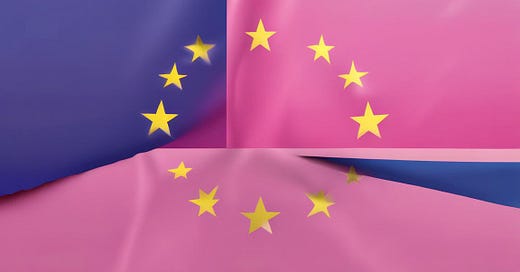Europe, More Or Less
Austrian voters look set to reward parties in Sunday's European Parliament elections that offer a clear vision for Europe one way or the other
Servus!
We’re in the final phase of campaigning for the European elections on June 9. In-person voting will take place on Sunday, though Austrian citizens living either in Austria or abroad may already have voted by post. The result should be announced on Sunday evening.
The most recent Market/Der Standard poll, conducted and published at the end of May, indicates that the questions surrounding Green Party lead candidate Lena Schilling’s personal and professional conduct—which I wrote to you about two weeks ago—have taken their toll on the party’s electoral standing. Compared to Market’s last poll published May 6, the Greens’ vote share has fallen by three percentage points, leaving the party a distant fifth and opening up the possibility that they could lose one of their three seats in the European Parliament.
At present, the far-right Freedom Party (FPÖ) is out ahead on 27 percent, followed by the center-left Social Democratic Party (SPÖ) on 24 percent, the conservative People’s Party (ÖVP) on 22 percent, the liberal NEOS on 14 percent, and the Greens on 9 percent. The two other parties competing in these European elections—the far-left Communist Party (KPÖ) and a new, right-wing populist list called Democratic—Neutral—Authentic (DNA)—are polling below the 4 percent electoral threshold and thus wouldn’t win any seats in the European Parliament.
Were this poll borne out as a result on Sunday, these would be the first-ever European elections in Austria won by the far-right, and as such, the first in which neither the ÖVP nor the SPÖ emerged as the largest party. So, too, would it represent the NEOS’s best result in a European election. Those parties, then, that have run the clearest and most Eurocentric campaigns—pro-European in the NEOS’s case and very much anti- when it comes to the FPÖ—look set to be rewarded for it.
The NEOS and the FPÖ offer two competing visions of Europe: a federal union, a United States of Europe, on the one hand, with a more powerful European Parliament and deeper integration on matters like security and defense; and a union of the nations, in which power is taken from European institutions like the Parliament and the Commission and given over to the individual member states including via the Council. The FPÖ no longer really talks about leaving the EU—at least not openly—though it is plainly Euroskeptic and an Öxit referendum has been its position in the past.
This week, the Austrian Institute of Economic Research published a study looking at the possible effects on Austria of leaving the EU. Gabriel Felbermayr and Inga Heiland concluded that Austrian GDP would suffer a long-term hit of 7.8 percent, and that for a smaller, interconnected central European country like Austria, being in the EU brings a material economic benefit worth €3,860 per head of population. Austria, they argued, would benefit from more Europe like “a single market for energy” and “a capital markets union or a European infrastructure initiative.”
Austrian voters in general, however, are more likely to be wary of the EU than the average European citizen. In autumn 2023, only 42 percent of Austrians thought their country’s membership of the EU was a good thing compared to 61 percent of Europeans continent-wide. Fast forward to spring 2024, and 27 percent of Austrians said the EU conjures up a negative image for them versus 18 percent of Europeans. Austrians are also less likely to describe themselves as European or say they trust the EU. Such conditions, in part, explain the FPÖ’s appeal among a hardened minority of voters and point towards their path to a likely victory on Sunday.
Bis bald!
Thank you for subscribing to the Vienna Briefing. Every recommendation helps, so if you know someone who might be interested in reading this newsletter, consider sharing it with them today.
The Vienna Briefing is a reader-supported publication made possible by your donations. If you would like to contribute to my work, think about sending me a tip.
Brigitte Bierlein, 1949-2024
Former chancellor Brigitte Bierlein has died at the age of 74. Bierlein was serving as president of Austria’s constitutional court when, in June 2019, she was appointed the country’s first female chancellor, leading a caretaker government through a period of political crisis in the aftermath of the Ibiza affair.
Sobotka’s Out
President of the Austrian Parliament Wolfgang Sobotka (ÖVP) is to leave front-line politics and won’t run for a seat in parliament in September’s national elections. The former interior minister’s approval rating was the lowest of any politician in the country in May’s APA-OGM confidence index.
Inflation Down, Unemployment Up
The rate of inflation in Austria fell to 3.3 percent in May, according to initial estimates, even as it rose slightly across the Eurozone as a whole. There was less good news about unemployment, which ticked up to 6.4 percent in May, up 0.5 percentage points year-on-year.




